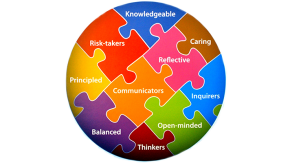A Message from the Head of Lindfield Campus
Behaviour Management
I read an article recently that focused on students with chronic behaviour issues and it reminded me of when I was teaching second grade and I had a particularly challenging student. I was not sure what to do with him. It was tempting to focus on the misbehaviour, but if I did that I was never going to get to the source of the issue. In the end, I began to read the signs and work out in which situations this student was going to act out. A set of procedures was devised that allowed him the opportunity to self-regulate. He was given a picture of a dolphin, which he would flash if he was going to melt down. He was also taught to go to a designated quiet area, take some deep breaths and read a book. He was also able to go for a quick run to the playground and back to regulate himself, if he needed a break.
This article I read, focused not on misbehaviour but on the idea that it is a lack of skills that is often the cause of the misbehaviour. It starts with asking ‘why was the student misbehaving?’ and the presumption is that the student is misbehaving because they lack the skills to behave in the appropriate ways. It may be that the student has difficulty with transitions, social cues, sequencing, organisation or emotional regulation. If there are missing skills, the result may lead to misbehaviour that is either ignored or punished. These reactions do not eliminate behaviours or endow students with the necessary skills for learning. If we think about it from a skills and timing approach, we can identify unsolved problems, predict problem situations and help students develop skills to prevent them. Very interesting food for thought as it questions the effectiveness of systems of punishment or reward.
Discipline is an opportunity for students to learn from their mistakes, understand the relationship between actions and consequences and to develop pro-social decision making skills. Here at Newington, we try to establish a school characterised by: emotional and physical safety, connectedness, authentic challenges and a responsible peer climate. An effective discipline policy facilitates positive behavioural support, positive relationships, engaging teaching and social-emotional learning.
The elements that are necessary in order to enhance these attributes are based on three premises:
Environment – Effective classroom teaching is essential in order to create energy, focus and high levels of student engagement. If a class is engaged, then most behavioural issues will decline as a result. There are many complex elements that affect this classroom environment but lesson planning, teaching conceptually, giving students choice and lesson pacing are some of the considerations in classroom management.
School-Wide Behavioural Supports – As a school, it is important to develop systems that prevent misbehaviour and teach pro-social behaviour, through active teaching and the use of modelling and role plays. There needs to be a system of school-wide rules and interventions, clearly delineating what is dealt with directly by the classroom teacher and what is an issue that needs to be addressed by school leaders. There also needs to be selective intervention for students who have difficulty following behaviour protocols, and focused actions and supports for chronically at risk students. There are certain ‘bottom line’ behaviours that have no place in our school and that immediately result in a consequence, however, this process also involves student reflection about more appropriate choices that could be made in future.
Social-Emotional Learning – Social-Emotional Learning (SEL) is the explicit teaching of self-awareness, self-management, social awareness, relationship skills and decision making. Newington uses the Second Step program to help the boys develop the social and emotional skills needed to negotiate the complex situations that they will increasingly face.
Each of the three areas of school-wide discipline are not effective in isolation. The combination of a positive environment, school-wide behavioural supports and Social-Emotional Learning (SEL) are essential for effective schools.
Effective schools share certain common characteristics: shared values based on mission/purpose and the traditions of the school, connectedness of students and staff, social-emotional learning, home-school partnerships and are fully responsive to the needs of children. Boys do not enter Newington College with a complete set of social-emotional skills. We hope that through the emphasis on explicit teaching through Second Step, unpacking the learner profile attributes, our discipline policy and effective teaching, we are providing a safe, connected environment for all of our boys.
“How Can We Improve School Discipline?” by David Ocher, George Bear, Jeffrey Sprague, and Walter Doyle in Educational Researcher, January/February 2010 (Vol. 39, #1, p. 48-58)
“Using a Discipline System to Promote Learning” by Marvin Marshall and Kerry Weisner, Phi Delta Kappan, March 2004 (Vol. 85, #7, p. 498-507)
“Calling All Frequent Flyers” by Ross Greene in Educational Leadership, October 2010 (Vol. 68, #2, p. 28-34)
Ben Barrington-Higgs






